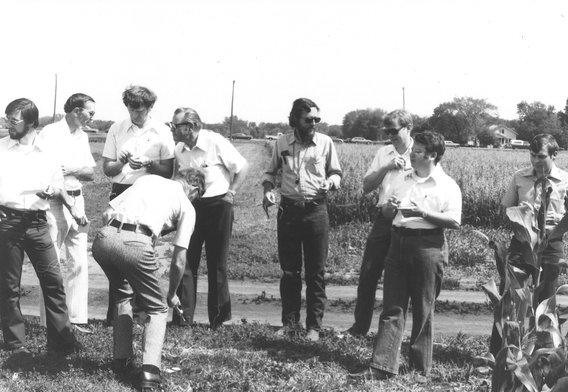
Richard Morrison ‘72 turned a PhD in plant pathology into a long and fruitful career in the seed industry. He joined us on a call from his home to discuss the foundations he built during his time at the University of Minnesota, and how he (and the University) have grown since then.
Foundations in forest and field
Morrison grew up in Southern California near Los Angeles, and first developed an interest in plant pathology while studying biology at California Polytechnic University. His advisor, a plant pathologist, sparked his interest in the field, and close family friends with a home in Grand Rapids, Minnesota introduced him to the Land of 10,000 Lakes.
Fascinations with forestry and plant health converged when Morrison began his graduate studies at the University of Minnesota. When he started in Professor Dave French’s forest pathology lab, Morrison recalls feeling like a bit of a Californian fish out of water: “I showed up with this beard, which I’ve never shaved off, and that was a bit of a shock for the department, which was quite prosaic in those days. I was somewhat of a free spirit, let’s put it that way.” Though Morrison got his Master’s under French, he changed advisors to Professor Thomas King for his PhD, who recognized Morrison as a strong student and recruited him to research Aphanomyces root rot in pea plants for his PhD. King provided both great mentorship and ample autonomy to Morrison, allowing him to flourish in his own work style and discover the types of work he enjoyed doing.
Creative and collaborative by nature, Morrison used grad school as an opportunity to develop the many skills that would later help him build a solid foundation for work in the seed industry. He credits his time as a Gopher with instilling the discipline and problem-solving skills required to succeed in a plant pathology career. The Tuesday afternoon seminars were definitely a formative experience, one in which the presenter needed to be well prepared and knowledgeable on the subject, and where students learned to make effective professional presentations.
The seeds of a great career
Passionate about problem-solving and working with others, Morrison weighed job options in Extension and industry upon graduation with his PhD in 1972. A recommendation from King led him to a summer gig at Green Giant. When it ended, a UMN Department connection led him to a job opening at Northrup King, which was then a family-owned seed company headquartered in Minneapolis.
At that time, it was unusual for breeding/seed production companies to have full time plant pathologists. But, as a result of the epidemic of southern corn leaf blight (SCLB) ravaging field corn crops, Morrison was hired by Northrup King to assist breeders in developing resistance to SCLB, as well as diseases of a number of field and vegetable crops. He adds, “I always tell plant path grad students and others that job opportunities open up when there’s an epidemic, or some kind of plant disease disaster.”
When Northrup King was corporatized, Morrison needed a change of pace and made a move to a new seed research station in Salinas, CA being opened by Japanese company Sakata Seed. In the younger, smaller organization, Morrison was tasked with developing plant pathology programs in breeder support, seed health and seed production: “Building something is exciting to me,” he recalls. Sakata Seed specializes in vegetables and flowers, and the plant pathology programs quickly contributed to the success of the company. Many of the core values of plant pathology—applied and practical work, good science and application of the basic principles of plant disease management—formed the lasting cornerstones of Morrison’s thirty-five year seed industry career.
Thoughts for current students
There is no one right way to build a career in plant pathology, and there are many ways to do it! “Everybody has a different path and interests,” Morrison emphasizes. “Not everybody’s built for every position or every situation, so it’s important to know yourself and identify the goals that will make for a satisfying plant pathology career.”
Some values Morrison says are keys to career success are thoroughness, openness, integrity, dependability, common sense, and honesty. He also emphasized the importance of being helpful to others. “One of the first things you need to learn is to listen first. You don’t go in there and tell people what to do—you listen, and then you process that information, and then you speak, or say you’ll get back to them, and then you make sure you do.”
Morrison sees the increase in diversity among plant pathologists in industry, and at major universities, including Minnesota, as a positive change from his time in the Department, despite the work still left to be done. “Whether it has to do with gender, or culture, or socioeconomic class, we have all these minds out there, and it’s such a waste not to give them access to the opportunity to develop their minds so they can have a meaningful career and be a benefit to society.”
